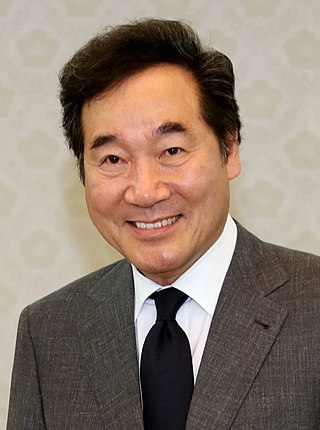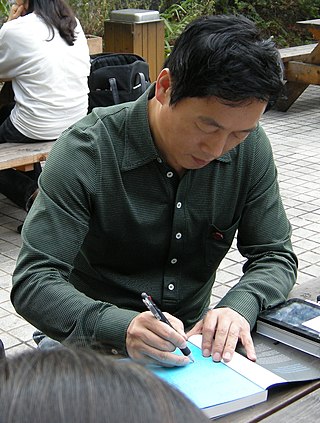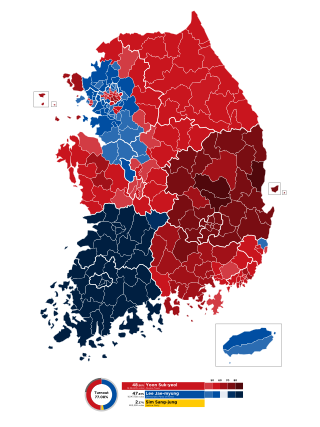
Left-wing populism, also called social populism, is a political ideology that combines left-wing politics with populist rhetoric and themes. Its rhetoric often includes elements of anti-elitism, opposition to the Establishment, and speaking for the "common people". Recurring themes for left-wing populists include economic democracy, social justice, and skepticism of globalization. Socialist theory plays a lesser role than in traditional left-wing ideologies.

Lee Sang-deuk was a South Korean politician and businessman. He was well known as the older brother of the former South Korean president, Lee Myung-bak. He was a member of the conservative Saenuri Party in the National Assembly. He was convicted of bribery in 2013, and sentenced to a prison sentence of one year and two months.

The Lee Myung-bak government was the fifth government of the Sixth Republic of South Korea. It took office on 25 February 2008 after Lee Myung-bak's victory in the 2007 presidential elections. Most of the new cabinet was approved by the National Assembly on 29 February. Led by President Lee Myung-bak, it was supported principally by the conservative Saenuri Party, previously known as the Grand National Party. It was also known as Silyong Jeongbu, the "pragmatic government", a name deriving from Lee's campaign slogan.

Presidential elections were held in South Korea on 19 December 2012. They were the sixth presidential elections since democratization and the establishment of the Sixth Republic, and were held under a first-past-the-post system, in which there was a single round of voting and the candidate receiving the highest number of votes was elected. Under the South Korean constitution, a president is restricted to a single five-year term in office. The term of the then incumbent president Lee Myung-bak ended on 24 February 2013. According to the Korea Times, 30.7 million people voted with turnout at 75.8%. Park Geun-hye of the Saenuri party was elected the first female South Korean president with 51.6% of the vote opposed to 48.0% for her opponent Moon Jae-in. Park's share of the vote was the highest won by any candidate since the beginning of free and fair direct elections in 1987 and the first such election in which any candidate won a majority. Moreover, as of the 2022 election, this is the latest South Korean presidential election in which the winning candidate won an absolute majority of the vote.

The Democratic Party, formerly the Democratic United Party until 2013, was a liberal political party in South Korea, and for the duration of its existence the country's main opposition force.

The Justice Party is a centre-left to left-wing political party in South Korea. It has been described as liberal and progressive. It was founded on 21 October 2012 when the former New Progressive Party faction, former People's Participation Party faction, and moderates in the Unified Progressive Party split from the Unified Progressive Party. The Justice Party now takes a more moderate stance than the United Progressive Party or the Democratic Labor Party in the past. The Justice Party temporarily changed its name to, "Green-Justice Party" (녹색정의당) on 30 January 2024 in an electoral pact with the Green Party Korea for the 2024 South Korean legislative election. On 27 April 2024, the party reverted back to its original name.

The Democratic Party, formerly known as the New Politics Alliance for Democracy, is a centrist-liberal South Korean political party. The DPK and its rival, the People Power Party (PPP), form the two major political parties of South Korea.

Yoo Jae-myung is a South Korean actor. He is best known for his roles in the series Reply 1988 (2015), Stranger (2017), Life (2018), Itaewon Class (2020) and Voice of Silence (2020). He won Best Supporting Actor at the 6th APAN Star Awards.

Lee Jae-myung is a South Korean politician serving as a member of the National Assembly and the leader of the Democratic Party of Korea. Lee was the nominee of the Democratic Party in the 2022 South Korean presidential election. He was the 35th Governor of Gyeonggi Province from 2018 to 2022.

Lee Nak-yon, also known as Lee Nak-yeon, is a South Korean politician who served as the 45th prime minister of South Korea from 2017 to 2020. A member of the New Reform Party, he is the longest-serving prime minister since the Constitution of South Korea was last revised in 1987. Lee previously held the governorship of South Jeolla Province province from 2014 to 2017, a stronghold of his party. Before serving as governor, he worked as a journalist for over 20 years and served as a member of the National Assembly for four terms.

The Progressive Party (Korean: 진보당), formerly known as the Minjung Party until June 2020, is a left-wing progressive and nationalist political party in South Korea. The party was formed by the merger of the New People's Party and People's United Party on 15 October 2017.

The People Power Party, formerly known as the United Future Party, is a conservative and right-wing political party in South Korea. It controls the South Korean presidency and is the second largest party in the National Assembly. The PPP, along with its historic rival, the Democratic Party, make up the two largest political parties in South Korea.

Chung Bong-ju is a South Korean politician and the former Member of the National Assembly for Nowon 1st constituency from 2004 to 2008.

Presidential elections were held in South Korea on 9 March 2022. Under the South Korean constitution, presidents are restricted to a single five-year term, meaning that incumbent president Moon Jae-in was ineligible to run for a second term. Opposition candidate Yoon Suk Yeol of the People Power Party won the election, defeating candidate Lee Jae-myung of the incumbent Democratic Party.

Choi Jieun is a South Korean economist and politician. She served as the spokesperson for and senior policy advisor to Lee Jae Myung, the previous presidential candidate of the Democratic party and current party leader. Also, Choi is an adjunct professor at Seoul National University and a member of the Presidential Policy Planning Committee under the Moon Jae In administration. Before entering politics in 2020, Choi worked as a senior economist at the World Bank and the African Development Bank.

Legislative elections were held in South Korea on 10 April 2024. All 300 members of the National Assembly were elected, 254 from first-past-the-post constituencies and 46 from proportional party lists. The two largest parties, the liberal Democratic Party and the conservative People Power Party, once again set up satellite parties to take advantage of the electoral system.

Gangbuk B is a constituency of the National Assembly of South Korea. The constituency consists of parts of Gangbuk District, Seoul. As of 2024, 128,295 eligible voters were registered in the constituency. The constituency was created in 1996 after being reorganized from the Dobong B and Dobong C constituency.

Eunpyeong B is a constituency of the National Assembly of South Korea. The constituency consists of parts of Eunpyeong District, Seoul. As of 2024, 195,270 eligible voters were registered in the constituency. The constituency was created in 1988 from the Seodaemun–Eunpyeong constituency.
Myung Tae-kyun is a South Korean businessman and journalist who is known to be a key figure in the 2024 political scandal involving first lady Kim Keon-hee and several conservative politicians. He is well known in South Gyeongsang Province and is suspected of conducting unverified polls and illegally intervening in various elections through the "Future Korea Research Institute" (미래한국연구소) he founded.



















